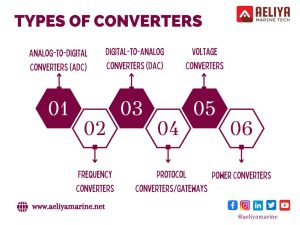What Are Industrial Converters?
Industrial converters: Basically, they are units, which transform one energy from to another or vary electric signals according to particular needs. Put simply, it’s a device that would play the role of a translator for energy signals-just as translators do a job by changing the way signals are given from a one language into another, that also helps to understand their sense clearly.
Example:
- They can convert AC power into DC power.
- They regulate the voltage, current, or frequency levels.
- They optimize energy flow in industrial systems.
Since the industrial sectors make use of high-power machines and complex systems, converters play an important role in managing the power safely and effectively.
Imagine trying to power your smartphone directly from a high-voltage industrial power source. It would never work and would most probably destroy the device. Industrial converters are the middlemen that make power suitable for use.
Key Benefits
Energy Efficiency: Converters help improve energy utilization, ensuring minimal energy loss. This reduces waste and saves costs.
Machine Protection: In controlling voltage and current, converters prevent machines from being destroyed.
System Optimization: They ensure that the electrical system is perfectly controlled so that the machines work at the specific speed or power level they are desired to work.
Versatility: From tiny electric devices to giant turbines, converters change energy for all types of industrial requirements.
Without converters, factories and systems would be inefficient, costly, and far more prone to breakdowns.
Types of Industrial Converters
Industrial converters come in different kinds depending on their function. Let’s look at some of the most common ones
1. AC to DC Converters (Rectifiers)
What they do: They convert AC to DC.
Why they matter: Many machines and electronic devices run on DC power. Since most power grids supply AC power, rectifiers ensure the electricity can be used efficiently.
Where they are used: Battery charging systems, electroplating industries, and computers.
2. DC to AC Converters (Inverters)
What they do: They convert DC back into AC.
Why they matter: AC power is easier to transmit over long distances. Inverters are essential in solar power systems where energy from the solar panels (DC) needs to be converted to AC for use.
Where they are used: Renewable energy systems, UPS, and motor drives.
3. DC to DC Converters
What they do: Convert the voltage level of DC power. They can either step up or step down a voltage.
Why they matter: They ensure that the right amount of voltage is delivered to equipment, thus avoiding overloading or under-powering
Where they are used: Electric vehicles, laptops and power distribution systems
4. AC to AC Converters
What they do: They adjust voltage, frequency, or phase of ac power
Why they matter: They enable machines to function at variable speeds and work in conjunction with other power systems
Where they are applied: Industrial motors, HVAC systems, and power grid stabilization.
How Industrial Converters Work
Fundamentally, converters operate on electronic components such as transformers, diodes, transistors, and capacitors. For easy reference, here is a general description of some converters:
Rectifiers: This converter uses diodes that let current flow in one direction, converting AC to DC.
Inverters: Inverters use switching devices to alter the flow of current. They convert DC to AC.
DC-DC Converters: They increase or decrease voltage levels by using inductors and capacitors.
AC-AC Converters: They adjust power through electronic switching techniques, such as phase control or frequency regulation.
Though the technology is complex, the outcome is straightforward: clean, stable, and controlled energy that industries can put to good use.
Applications of Industrial Converters in Real Life
Now that we know what industrial converters are and how they work, let’s look at their applications in real life:
1. Renewable Energy Systems
Converters play a critical role in solar and wind power systems. Solar panels generate DC power, but homes and businesses need AC power. Inverters convert this DC into usable AC power.
2. Electric Vehicles (EVs)
Electric vehicles rely on DC power stored in batteries. DC-DC converters help regulate voltage to power different parts of the car, like the motor, headlights, and onboard systems.
3. Manufacturing and Automation
Factories utilize converters to efficiently run machines. AC-AC converters regulate the speed of the motor of machines, so they are accurate and energy-efficient in operation.
4. Data Centers and Power Backups
Data centers make use of UPS systems. Converters ensure stable DC power for servers and convert back to AC when there is a power failure.
5. HVAC Systems
Heating, ventilation, and air conditioning systems use converters to regulate motor speeds for efficient temperature control.
Future of Industrial Converters
With technological advancements and the increased demand for clean energy, industrial converters are changing at a rapid pace. Some of the most exciting trends include:
Smart Converters: Devices with AI and IoT integration for real-time monitoring and optimization.
Energy Storage Systems: Improved converters for efficient battery storage and grid balancing.
Sustainable Solutions: High-efficiency converters to reduce energy loss and carbon footprints.
With industries taking their paths towards automation, renewable energy, and digital systems, the future of industrial converters is an even brighter one for the creation of a sustainable future.

